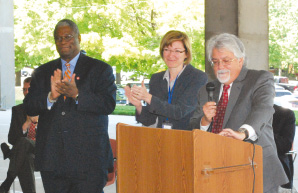
By Leslie Collins
Northeast News
July 13, 2011
They didn’t dress in shiny cap and gown, but that didn’t matter.
For these graduates, a tassel turning was unnecessary. This was an indelible accomplishment.
These graduates passed more than a final exam they passed the rigorous Jackson County Drug Court and Family Drug Court Diversion Program.
For at least 180 consecutive days these graduates had remained drug-free and their drug related charges were now being dropped and their slate wiped clean.
“I am so proud of you,” Jackson County Prosecutor Jean Peters Baker told the graduates during the recent graduation at Jackson County Family Court. “When I look into your eyes I see people with a lot of promise a long road ahead, but a road that you’re prepared to walk.”
Since its conception 18 years ago, more than 1,200 people have graduated from the Drug Court program and more than 96 percent of graduates remain conviction free for the next five years, Kansas City Mayor Sly James said.
“I know that you take this seriously and I know that you have learned things here that have absolutely changed your lives,” James said. “As of your graduation, you’re employed, you’ve worked hard and you have no criminal record. That’s an opportunity that doesn’t come very often. That’s a second lease on life.
“Each and every one of you has fulfilled a promise that you made to yourselves. Each and every one of you has fulfilled a promise to somebody that you love… You made a promise to them that you would succeed and each and every one of you has.”
For one graduate, drug court graduation meant her two young boys could now reunite with their mother.
“When I first started the program, I thought this was the worst thing that ever happened to me,” the young mother said. “They took my boys. My foster mother Trish was the best person to take care of my kids when I couldn’t.”
Without the support of her family and drug court, she wouldn’t be working a 40-hour a week job, she said.
As she continued to speak, her two sons ran up to the front and squeezed her tightly. With tears she hugged them back and said, “I just want to say thank you. This is a wonderful program.”
Concept of drug court
Jackson County became the second county in the nation to operate a drug court which allowed non-violent offenders to graduate from the diversion program and have their charges dismissed. Whether it’s through Drug Court or the Family and Juvenile Drug Court, the program typically lasts 12 to 18 months and includes individual and group counseling, job counseling, random and frequent drug testing and required attendance to 12-Step or other approved support groups. For each enrollee, a treatment team prepares an individualized treatment program.
Participants must also complete 40 hours of community service, appear regularly before the drug court commissioner to discuss their progress in the program and have employment or approved educational or vocational programming at least 90 days prior to graduation. They must also be drug free for at least 180 days prior to graduating.
“The unique thing in the drug court model is you must come to court on a regular basis and get credit for what you’re doing and held accountable for what you’re not,” Drug Court Commissioner David Fry said. “There’s this immediate authority figure to intervene and push you or pull you to success.”
Locking up an addict isn’t the answer, he said.
“When you look at the cost of a penitentiary and compare that to the cost of drug court, what you find is we’re incredibly cheap and we’re much more successful,” he said. “Drug court works and it’s money well spent.”
Asked what she likes about the Family Drug Court program, Family Drug Court Commissioner Molly Merrigan said, “I really believe it helps these families. A lot of our clients are single moms who have had some tough circumstances of their own and they’re trying to take care of two and three kids all by themselves.
“Being able to see them get up on their feet, get their GED, get a job and have their kids with them and take good care of their kids is just a wonderful experience to get to see.”
Common drug abuse Jackson County courts see include meth, cocaine, crack cocaine, prescription medicines and PCP.
“PCP is one of the most dangerous drugs out there,” Merrigan said. “It can create psychosis and it’s very addictive.
“Even when you’re not under the influence of it, you can have a psychotic break and become very violent and aggressive. Somebody who’s been chronically using it I mean every single day has the potential to be very dangerous.”
As a result, parents addicted to PCP in the drug court program sometimes aren’t allowed to see their children right away.
However, for parents in Family Drug Court, visitation with their children is vital, said Penny Clodfelter, program manager for Family and Juvenile Drug Court.
Jackson County recently clinched a three-year federal grant for its Family Drug Court visitation project to connect more parents with their children on a weekly basis for longer periods of time.
“The impact that separation has on children when they’re removed from their parents is huge,” Clodfelter said. “There’s been a lot of research done over the last 15, 20 years on the impact this has. Children begin to disengage almost immediately with their parents and parents as well (if they’re not allowed to visit on a regular basis). Even with the very worst parent, a child still wants to be with that parent because that’s all they know.”
Through the visitation project, parents will receive parent-child interaction therapy and learn how to appropriately discipline their children and interact with them.
“When you look at the costs, you either pay now or later when you’re trying to fix families that are broken,” Clodfelter said. “It’s cheaper to pay now than later.”
Clodfelter added that some of the most successful people, including presidents, in the United States have struggled with addiction.
“It crosses all demographics. You can be rich. You can be poor… Unless the addiction is addressed and you get the support you need, which drug court offers, things have the potential to remain the same,” she said.
In terms of success, Clodfelter looked behind her at the bulletin board filled with pictures of smiling faces.
“Those are some of my kids,” she said. “People will send Christmas cards along the way or they will stop by and say here’s a new picture.
“Here’s one where they just got married three months ago and they wanted to make sure I had this.”
Clodfelter’s also received graduation invitations and calls or visits from graduates who say they’re doing well.
“I’m so happy for the families that make it, whose lives become normal,” she said. “They leave the chaos. They leave a lot of the drama and they really have a chance to parent maybe as the first time as a sober parent.”
One father at graduation learned what it meant to leave the drama. He thanked the drug court staff for their support and the clients for sharing their struggles.
“It’s a fight. It’s a war out there,” he said to his fellow graduates. “Fight for your life. Fight for the people that love you and need you. Love yourself. Respect yourself.
“I used to party all night and sleep all day. Today, I get up at 6:30 a.m. if not earlier because I’ve got a responsibility and not just because I have children to take care of, but I have a responsibility to show society I’m ready to move forward. I will fight for a better life.”


















